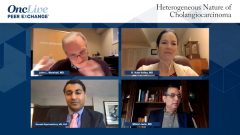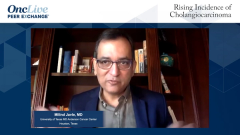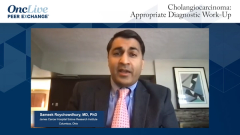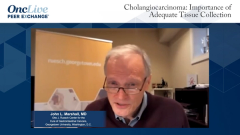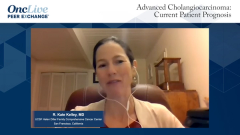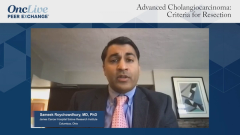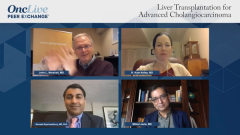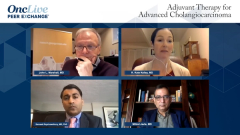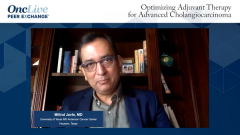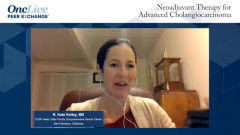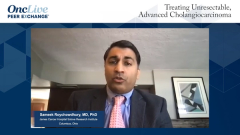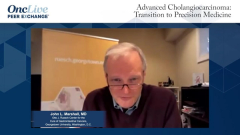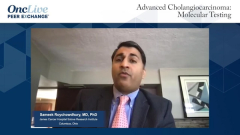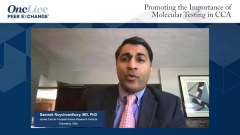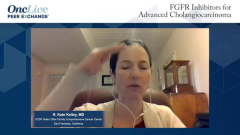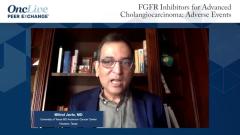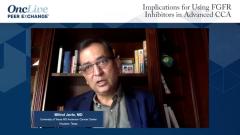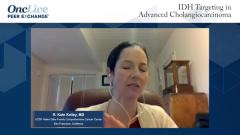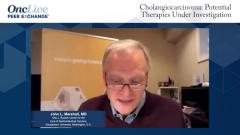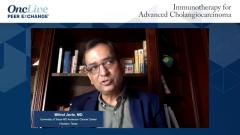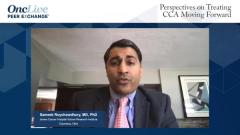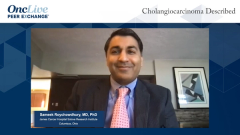
Optimizing Adjuvant Therapy for Advanced Cholangiocarcinoma
Insight regarding best timing to initiate an appropriate adjuvant therapy in patients with advanced cholangiocarcinoma, and the role of ctDNA analysis in the postsurgical setting.
Episodes in this series

John L. Marshall, MD: I want to discuss this from ASCO GI [American Society of Clinical Oncology Gastrointestinal Cancers Symposium] in January. We’re all taught that you want to get started on your adjuvant therapy as soon as possible. Because we know a lot of these patients with cholangiocarcinoma post-op don’t hit our doors that fast or that reliably, there was a nice study looking at the initiation of adjuvant therapy. They don’t specify what drugs they gave. It’s just sort of chemotherapy or chemoradiation, and they saw no difference if it was 2, 3, or 4 months. I’m not sure that’s an argument to delay. Our principle still should be, “get them in if you can,” and get it started. Everybody agree?
R. Kate Kelley, MD: My 1 caveat would be that in patients who’ve had extended hepatic resections, we want to make sure the liver has time to regenerate. Even in a patient who’s recovered really well, if they had a lot of their liver removed, I tend to prefer to wait for at least the 8- to 10-week mark.
John L. Marshall, MD: Fair enough.
R. Kate Kelley, MD: There are not a lot of data behind that, but usually, people need at least the 8 weeks to recover well from an extended resection.
John L. Marshall, MD: I like that. I completely understand the biology, but I would sit there and be nervous. This study helps reduce our nervousness on that.
R. Kate Kelley, MD: Yes.
John L. Marshall, MD: The second point again. 5-FU [fluorouracil] is still the best drug out there, right? It works beautifully. CAPE [capecitabine] is probably the best way to give it; we see this with S-1 data, this continuous exposure approach. I worry about the new adjuvant study of GEM [gemcitabine]/CIS [cisplatin] vs CAPE because I was wanting GEM/CIS/CAPE vs CAPE so that you kept it in both sides. In almost all our cancers—adjuvant, GI [gastrointestinal] cancers—adjuvant fluoropyrimidine helps in this non-fluoropyrimidine–based treatment. Anybody have thoughts about that, the critical role? I take capecitabine every day for prevention. What do you think?
Milind Javle, MD: Katie summarized it eloquently. However, when you look at subset analysis, the hilar cholangiocarcinoma and gallbladder cohorts in the BILCAP study didn’t benefit. It was not planned a priori. However, the hazard ratio crossed. It didn’t seem to be benefiting those population subgroups. There may be a case for GEM/CIS or, especially in case of hilar cholangiocarcinoma, where there’s a risk of local recurrence, for radiation therapy based on the SWOG 0809 trial. Capecitabine was very effective in the intrahepatic cholangiocarcinoma cohort. That is a good option there, but I’m not so sure about the other biliary cancer types.
John L. Marshall, MD: One more controversial issue is in colon cancer. We’re increasingly using ctDNA [circulating tumor DNA] but are not sure what to do with that. Is there a role for that kind of analysis in resected bile duct cancers?
Sameek Roychowdhury, MD, PhD: Sure. If you’re talking about surveillance or minimal residual disease, it’s not quite our standard yet. In most of these ongoing studies for adjuvant therapy, it’s an interest. How useful are ctDNA markers as a measure of tumor burden or as a target for future therapy? If we see early evidence that ctDNA burden is being affected by an adjuvant therapy, does that help affirm that was the right choice for adjuvant therapy? Does early relapse affected by ctDNA tell you about potential new approaches you might take in that population at high risk before they have a higher burden of disease? What the therapy is going to be, I don’t know. This is a research tool in the adjuvant setting, and it could guide detection of early relapse or the assessment of adjuvant therapy if there’s minimal residual disease that we’re treating effectively. That’s where ctDNA plays a role at the moment, postsurgical in that adjuvant surveillance setting. I’m excited to see what new studies will be coming to take advantage of that as a tool.
John L. Marshall, MD: Yeah, it will be increasingly more on our radar. It’s an interesting technology. As you said, we’re not sure what to do with it, but it is provocative technology.
Transcript Edited for Clarity


